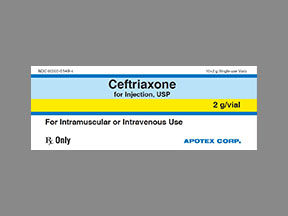
Ceftriaxone Coupons & Savings Card – Discount Prices from $1.01
Ceftriaxone is a versatile antibiotic used to combat various bacterial infections. It belongs to the cephalosporin class of antibiotics and works by halting bacterial growth. This medication is commonly administered via injection, either intravenously or into a muscle, making it prevalent in hospitals, clinics, and sometimes at home. Ceftriaxone is effective against lower respiratory tract infections, ear infections, stomach infections, urinary tract infections, skin infections, bone and joint infections, bloodstream infections, meningitis, gonorrhea, pelvic inflammatory disease, and for preventing infections post-surgery. While generally well-tolerated, it is not recommended for newborns with high bilirubin levels or premature infants due to potential side effects. If you have a penicillin allergy, you may still be able to use ceftriaxone, depending on your specific reaction. Always consult with a healthcare professional before starting any new medication.
Our coupons are free to use. Before paying, show the pharmacist your Ceftriaxone savings card to get your free discount. Use our filters below to edit the prescription box to match your needs. The Ceftriaxone prices will update based on your prescription needs. Above our Ceftriaxone coupons, you can change your location to see pharmacy prices and costs in other areas. We're here to help you buy Ceftriaxone at the lowest price with our prescription discount card.
My prescription
Edit
2GM, Ceftriaxone (1 Solution Reconstituted)
Select pharmacy

CVS
$21.15
COUPON PRICE
Walmart
$1.01
COUPON PRICE
Albertsons
$6.63
COUPON PRICE
Walgreens
$6.63
COUPON PRICECeftriaxone savings card
Show this card to your pharmacist
Walmart
$1.01
BIN
ID
PCN
GRP
019876
LH624D4281
CHIPPO
LHX
Powered by
Ceftriaxone is a versatile antibiotic used to combat various bacterial infections. It belongs to the cephalosporin class of antibiotics and works by halting bacterial growth. This medication is commonly administered via injection, either intravenously or into a muscle, making it prevalent in hospitals, clinics, and sometimes at home. Ceftriaxone is effective against lower respiratory tract infections, ear infections, stomach infections, urinary tract infections, skin infections, bone and joint infections, bloodstream infections, meningitis, gonorrhea, pelvic inflammatory disease, and for preventing infections post-surgery. While generally well-tolerated, it is not recommended for newborns with high bilirubin levels or premature infants due to potential side effects. If you have a penicillin allergy, you may still be able to use ceftriaxone, depending on your specific reaction. Always consult with a healthcare professional before starting any new medication.
Our coupons are free to use. Before paying, show the pharmacist your Ceftriaxone savings card to get your free discount. Use our filters below to edit the prescription box to match your needs. The Ceftriaxone prices will update based on your prescription needs. Above our Ceftriaxone coupons, you can change your location to see pharmacy prices and costs in other areas. We're here to help you buy Ceftriaxone at the lowest price with our prescription discount card.
Related cephalosporin antibiotics prescriptions
coupons from$12.66Save 88%
coupons from$24.18Save 92%
coupons from$37.93Save 66%
coupons from$25.80Save 49%
coupons from$1.01Save 100%
coupons from$525.96Save -237%
coupons from$1.01Save 100%
coupons from$47.58Save 86%
More prescriptions for skin infection
coupons from$2.35Save 99%
coupons from$29.18Save 82%
coupons from$80.71Save 67%
coupons from$235.57Save 88%
coupons from$127.08Save 89%
coupons from$67.25Save 91%
coupons from$844.46Save 72%
coupons from$34.52Save 70%
Related cephalosporin antibiotics prescriptions
Cefdinir Save 88%coupons from $12.66
Cefpodoxime Save 92%coupons from $24.18
Cefadroxil Save 66%coupons from $37.93
Cefprozil Save 49%coupons from $25.80
Cefazolin Save 100%coupons from $1.01
Cefaclor Save -237%coupons from $525.96
Cefotaxime Save 100%coupons from $1.01
Suprax Save 86%coupons from $47.58
More prescriptions for skin infection
E.E.S. 400 Save 99%coupons from $2.35
Neomycin-polymyxin-hc Save 82%coupons from $29.18
Clarithromycin ER Save 67%coupons from $80.71
Azasite Save 88%coupons from $235.57
Clindacin Save 89%coupons from $127.08
Coremino Save 91%coupons from $67.25
Bicillin L-a Save 72%coupons from $844.46
Zyvox Save 70%coupons from $34.52
Ceftriaxone dosage forms
Use our Ceftriaxone 1GM coupon with prices from $4.66 for 1 Solution Reconstituted. You can also use our Ceftriaxone 1GM coupon with prices from $24.00 for 10 Solution Reconstituteds. We have a Ceftriaxone 1GM coupon with prices from $45.50 for 25 Solution Reconstituteds. You can use our Ceftriaxone 2GM coupon with prices from $1.01 for 1 Solution Reconstituted.
Dosage Quantity Price from Per unit 1GM 1 Solution Reconstituted $4.66 $4.66 1GM 10 Solution Reconstituteds $24.00 $2.40 1GM 25 Solution Reconstituteds $45.50 $1.82 2GM 1 Solution Reconstituted $1.01 $1.01 2GM 10 Solution Reconstituteds $13.98 $1.40 2GM 25 Solution Reconstituteds $23.70 $0.95 100GM 1 Solution Reconstituted $214.56 $214.56 250MG 1 Solution Reconstituted $7.76 $7.76 250MG 10 Solution Reconstituteds $18.26 $1.83 250MG 25 Solution Reconstituteds $32.15 $1.29
| Dosage | Quantity | Price from | Per unit |
|---|---|---|---|
| 1GM | 1 Solution Reconstituted | $4.66 | $4.66 |
| 1GM | 10 Solution Reconstituteds | $24.00 | $2.40 |
| 1GM | 25 Solution Reconstituteds | $45.50 | $1.82 |
| 2GM | 1 Solution Reconstituted | $1.01 | $1.01 |
| 2GM | 10 Solution Reconstituteds | $13.98 | $1.40 |
| 2GM | 25 Solution Reconstituteds | $23.70 | $0.95 |
| 100GM | 1 Solution Reconstituted | $214.56 | $214.56 |
| 250MG | 1 Solution Reconstituted | $7.76 | $7.76 |
| 250MG | 10 Solution Reconstituteds | $18.26 | $1.83 |
| 250MG | 25 Solution Reconstituteds | $32.15 | $1.29 |
| 500MG | 1 Solution Reconstituted | $1.01 | $1.01 |
| 500MG | 10 Solution Reconstituteds | $4.27 | $0.43 |
| 500MG | 25 Solution Reconstituteds | $17.22 | $0.69 |
